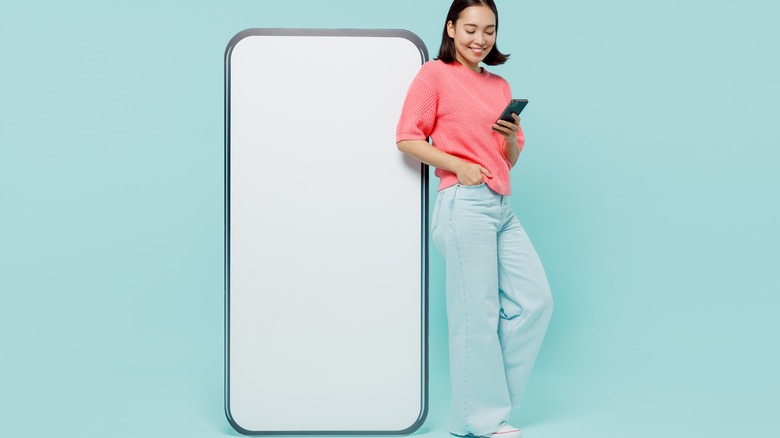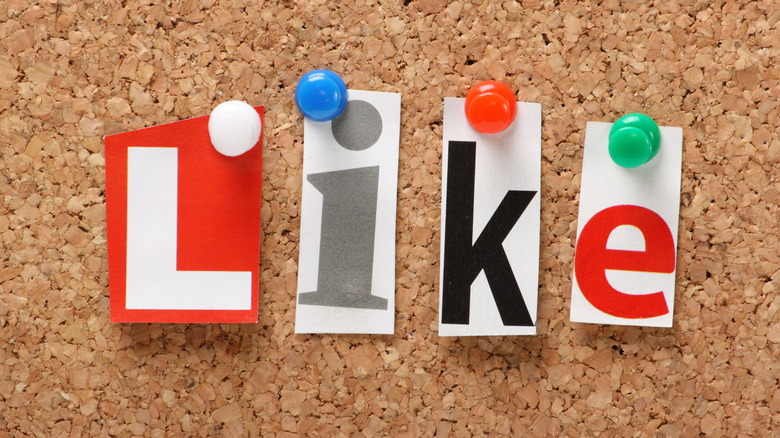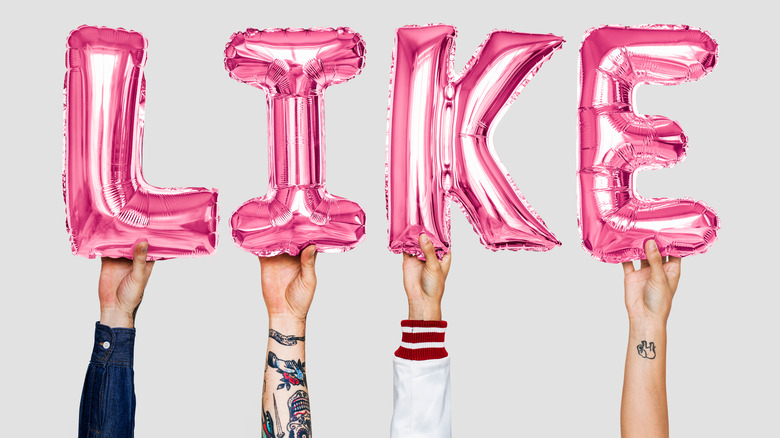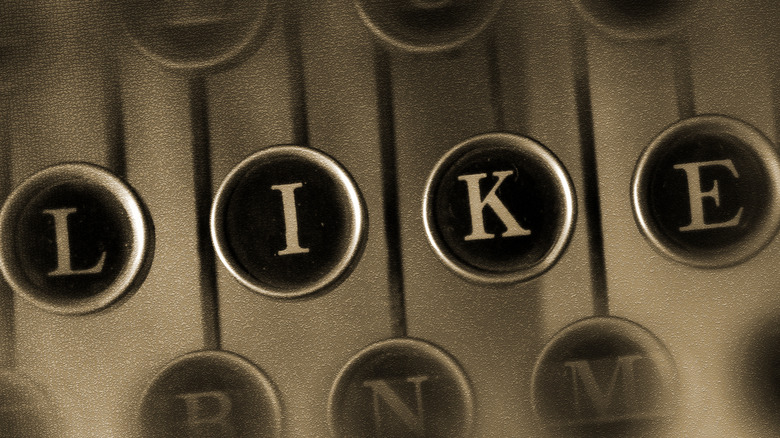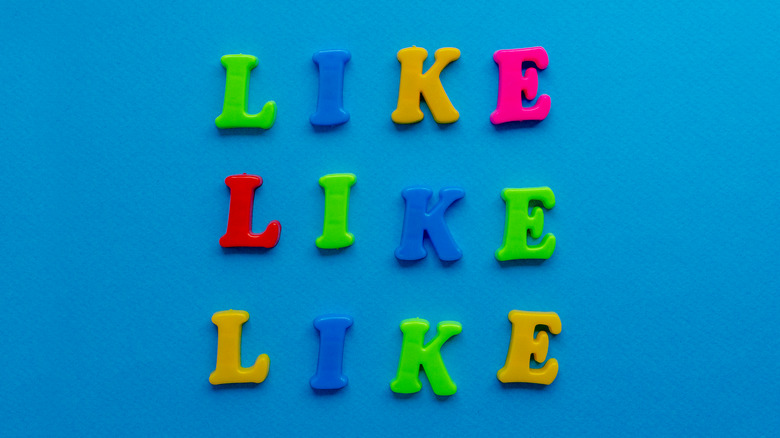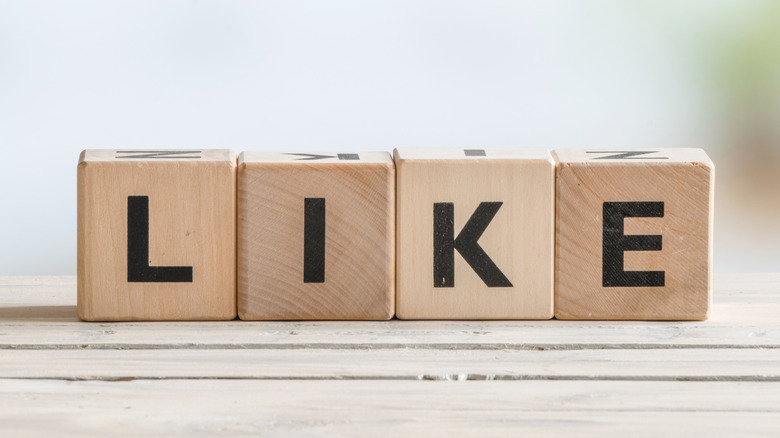The Real Reason Younger People Say 'Like' So Often
We may receive a commission on purchases made from links.
Like, um, er, well, you know, kind of, sort of, I mean, so — everyone uses filler words sometimes. When an overly zealous podcast editor removes all of them, the speakers end up sounding like robots mechanically reading from a script instead of human beings engaged in a conversation (per Descript). And sometimes filler words serve useful purposes, such as showing politeness or stopping others from interrupting during a speaker's pause, according to Harvard Business Review.
But there's no denying that one particular word is uttered — a lot — by younger people, annoying many older people in the process. Oldsters accuse youngsters of being everything from sloppy and lazy to ignorant and incoherent. But is the word "like" really the harbinger of the demise of the English language and the collapse of civilization as we know it?
Spoiler alert: "Like" is far more versatile, meaningful, and nuanced than you ever might have guessed. In other words, it's much more than filler.
'Like' is a surprisingly versatile word
Alexandra D'Arcy wrote the book on "like" — literally. The linguist and university professor is the author of "Discourse-Pragmatic Variation in Context," which spends 235 pages examining "the various contexts of 'like,' each of which contributes to the reality of contemporary vernaculars."
D'Arcy also contributed a shorter and more reader-friendly analysis of "like" to "Making Sense of Language: Readings in Culture and Communication" in which she focused on the four main uses of the word in vernacular speech, as distinct from traditional grammatical speech. The first use D'Arcy mentioned is the quotative "like," where the word takes the place of a verb such as "said" or "thought." She gave an example: "I was like, 'Where do you find these people?'"
Malcolm Gladwell seems particularly delighted by this way of using the word. He's the author of best-sellers such as "The Tipping Point" and "Outliers: The Story of Success" — one of the rare self-help books that won't make you roll your eyes — and in a 1992 article for The Washington Post he described this use of the word as "wonderfully vague." He wrote, "It could be what someone was thinking. It could be a paraphrase. Or it could be what they actually said. Imagine!"
'Like' has multiple uses in everyday speech
In her contribution to "Making Sense of Language: Readings in Culture and Communication," Alexandra D'Arcy outlined three more uses of "like" in vernacular speech. The word can be employed as an approximate adverb, where it means "about," in other words, "It could have taken you all day to go like thirty miles."
The third vernacular use of "like" is as a discourse marker, where the word functions similarly to "so," "then," or "well" by linking different sentences or parts of a sentence: "Nobody said a word. Like my first experience with death was this Italian family." In his article in The Washington Post, Malcolm Gladwell wrote, "The use of 'like' as what linguists call a 'discourse marker' is surprisingly complex and multifaceted."
And, finally, D'Arcy explained in "Making Sense of Language" that "like" can be used as a discourse particle, where — unlike with the discourse marker — the word is spoken in the middle of a clause: "And they had like scraped her." She wrote, "Whereas markers function at the textual level, particles operate in the interpersonal realm, aiding cooperative aspects of communication such as checking or expressing understanding." This way of using the word can lead to "a sense of sharing or intimacy."
People who say 'like' a lot are viewed as friendlier — and may actually be smarter
In "Making Sense of Language: Readings in Culture and Communication," Alexandra D'Arcy quoted a study that found that "speakers were rated significantly more attractive, cheerful, and friendly when they used 'like' as opposed to when they did not." This response held true even for people who disliked "like," leading D'Arcy to conclude that the word "serves important and palpable social functions in face-to-face interactions."
Friendlier, sure, but how about smarter? The image runs counter to the common perception that someone who says "like" constantly is a vapid Valley girl, as popularized in the Frank Zappa song of the same name and in the Alicia Silverstone movie "Clueless."
But a 2014 study in the Journal of Language and Social Psychology looked at transcriptions of conversations and concluded that people who use discourse markers such as "like" more often "are generally more thoughtful and aware of themselves and their surroundings." The study suggested that conscientious speakers use these discourse markers "to imply their desire to share or rephrase opinions to recipients. Thus, it is expected that the use of discourse markers may be used to measure the degree to which people have thoughts to express."
Younger people and women say 'like' the most
The study in the Journal of Language and Social Psychology noted that younger people and women use discourse markers such as "like" more often than older people and men. That shouldn't be a huge surprise, since teen girls have been disrupting language for centuries (per Quartz).
"It's generally pretty well known that if you identify a sound change in progress, then young people will be leading old people," linguist Mark Liberman told The New York Times, continuing, "women tend to be maybe half a generation ahead of males on average."
Younger people are constantly creating new slang or using old words in new ways — just look at the meanings on TikTok for "flex," "extra," "CEO of," and "sheesh." And as long as there have been young people, there have been oldsters criticizing the way those youngsters speak. "Like it or not, 'like' has become the lazy linguistic filler of our times," complained an article in (the very aptly named) The Oldie.
Young women get judged for saying 'like'
Much of the vitriol aimed at "like" may be because young women are the ones who use the word the most. There's a long history of criticizing and trying to change young women's speech patterns (per NPR).
"If women do something like uptalk or vocal fry, it's immediately interpreted as insecure, emotional, or even stupid," linguistics professor Carmen Fought told The New York Times in 2012. "The truth is this: Young women take linguistic features and use them as power tools for building relationships."
In reality, people of all ages and genders are saying "like" more and more often. A 2022 article in The Guardian also quoted Fought: "I'm 55, I have a PhD, many people would consider that to be a sign of intelligence, and I'm a 'like' user. So this judgy thing, it's natural, but it's really not helpful."
So, the next time someone argues that your tendency to say "like" all the time is a habit that annoys everyone and that you should work on correcting, just repeat the immortal words of the Dude: "That's just, like, your opinion, man."
